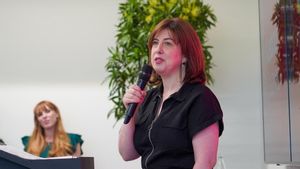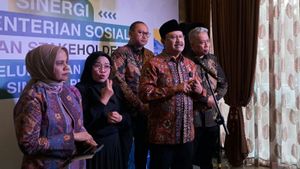JAKARTA - On Monday 5 June, Spotify announced its plans to terminate employment for 200 employees from its podcast unit and combine Gimlet and Parcast into a single operation. This decision surprised observers outside the company. However, the current ex and podcast employees on Spotify have actually felt these signs some time ago.
"We have indeed expected over the past few months that they will terminate employment because the atmosphere in the Gimlet has been very tense over the past few months," said one of the former Gimlet employees who was also included in yesterday's termination of employment, to Hot Pod. "There's no joy. [PHK] only a matter of when. What's surprising is that it happened yesterday."
It's been more than a year since Spotify first removed its podcast production unit. In the fall of last year, Spotify fired dozens of Gimlet and Parcast employees and halted production of 11 original events. Earlier this year, Spotify laid off employment of 600 employees across the company (including some work in advertising and business under Podsights and Chartable).
Leading executives such as the head of content Dawn Ostruff (which oversees Spotify's podcast operations) have left the company. Famous names, including Barack and Michelle Obama's Higher Ground Productions, Brené Brown, and Esther Perel, have come out of the deal with the platform. Jemele Hill hasn't left yet, but is considering other options.
As Bloomberg reported last week, neither Parcast nor Gimlet have ever received an annual budget, so they cannot allow the production of new events or approve travel costs. Just this week the public knows Spotify's reasons for this: neither Gimlet nor Parcast will be combined to form a new Spotify Originals studio focused on original production, including events such as Stolen, The Journal, Science Vs, Heavyweight, Serial Killers, and Conspiracy Theories.
Another fired Gimlet employee noted that production staff - producers, reporters, and engineers - seem to be the most affected by this termination of employment. Both non-fiction and fictional events were affected. Spotify spokesperson Grey Munford confirmed that Case 63, which launched its first season in the fall of last year, will continue.
The event was produced by Gimlet with production companies Julianne Moore and Oscar Issac, Forty Sixty and Mad Gene Media. According to Munford, most of the Gimlet fiction team behind Case 63, the fictional podcast, which is ranked high and stars Moore and Isssac, is now under Spotify's head of development, Liz Gateley.
Regarding what Spotify expects from the rest of the Gimlet and Parcast teams, it seems the company wants them not to deter companies from developing creators and third-party deals. The company clearly explains that the next stage of their podcast strategy is to focus on creators and users, including Spotify for Podcasters - advertising platforms and company monetization.
VOIR éGALEMENT:
"We know that creators have embraced global audiences on our platform, but they want better discoveries to help them improve their audience. We also know that they value the tools and support programs of our creators, but they want more options and flexibility in terms of monetization. Fortunately, Spotify is not a company that has ever been silent. Based on this learning and our leadership position, we have recently started the next stage of our podcast strategy, which focuses on providing greater value to creators (and users!)," wrote Sahar Elhabashi, head of Spotify's podcast business., quoted by The Verge.
The merger of Gimlet and Parcast appears to be an unnatural combination, according to a number of former employees. Parcast, acquired by Spotify in 2019, focuses primarily on true crime podcasts, with events such as Criminal Passion and Criminal Couples.
Gamelet is known for its audio journalism series and interview podcasts, as well as audio script dramas. Gamelet won its first Pulitzer Prize in an audio report earlier this year for Stolen: Surviving St. Michael's investigative journalist Connie Walker. Stolen's third season has even been approved.
"I'm not sure what it means to combine Parcast and Gimlet into a team. They have a very different style of production and development, so they need different support in terms of marketing, PR, development, and other skills," said one former Gimlet employee who left the company before layoffs this week.
Gamelet exploded in popularity mainly because of its original events that help define podcast trends. Serieses such as Reply All, The Nod, Heavyweight, and StartUp help raise standards about what can be achieved in audio stories, and advertisers and investors are competing to get involved.
However, under Spotify's leadership, both Gimlet and Parcast struggled to find a clear direction. Reply All ended up not so smoothly more than a year ago, and Gimlet under Spotify was no longer a commensurate success.
One of the factors causing it is Spotify's limited ability to fully understand what it bought with a total combination of around US$300 million (Rp4.4 trillion). The merger of Parcast and Gimlet is a good example of that.
"Our shows and content are very different," said one Gimlet employee who was fired last week. "The fact that Spotify combines it so awkward just shows that they never really understand or appreciate us."
The hasty merger and the termination of the original program reflect similar tactics from the world of video streaming, such as Warner Bros.'s decision. Discovery to combine HBO Max and Discovery Plus offerings is a streaming platform, or Paramount's decision to combine Showtime (which generates premium-scripted series like Yellowjackets) with Paramount Plus, which is home to events from CBS, BET, and TV Land, as well as live sports broadcasts.
These decisions reflect the reality of the current streaming environment which is limited in financial resources. Like Netflix, which used to make big purchases on Cannes and now makes reality shows like "Too Hot to Handle", Spotify moves away from expensive original programs and hugs amateur podcasters and partnerships with creators (without forgetting high-value celebrity audio deals, such as with Joe Rogan).
In both cases, the company reduces their original program for cheaper content to produce and generates more viewers and downloads.
Less prestigious content will not affect advertisers, according to Max Willens, a senior analyst at Insider Intelligence. "I could say that advertisers will welcome this decision in the sense that it might give them more inventory to advertise, perhaps at a longer price. Long-term content at high costs that characterizes Gimlet often requires premium advertising prices, which sometimes makes advertisers feel uncomfortable," Willens said.
However, for those working in the audio industry, Spotify's rapid exit from the world of original podcasting and audio journalism is in line with the behavior expected from the technology company.
"The people who were fired were some of the most talented and experienced producers in the industry," said a Gimlet staff member who left before this week's layoffs. "It's sad that Spotify never understood it - and how to optimize that creativity and experience."
The English, Chinese, Japanese, Arabic, and French versions are automatically generated by the AI. So there may still be inaccuracies in translating, please always see Indonesian as our main language. (system supported by DigitalSiber.id)













